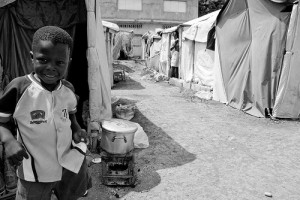In Haiti, 560 Infected With Cholera Daily
 Port-au-Prince, Haiti — Considering the conditions in the camp, it was no surprise that cholera reigned rampant mere months later. Cholera spreads in areas with inadequate treatment of sewage and drinking water, which surprisingly, is exactly how the United Nations appears to have left their camp just north of Port-au-Prince earlier this year.
Port-au-Prince, Haiti — Considering the conditions in the camp, it was no surprise that cholera reigned rampant mere months later. Cholera spreads in areas with inadequate treatment of sewage and drinking water, which surprisingly, is exactly how the United Nations appears to have left their camp just north of Port-au-Prince earlier this year.
A UN report explains that the organization may have itself been responsible for the cholera outbreak that has ravaged an already desperate Haiti this year. Although cholera is easily preventible with proper hygiene, camps in Haiti lacked access to potable drinking water, medical care, and a hygienic means to dispose of human feces and sewage. These conditions have facilitated the infections of 300,000 Haitians since cholera sprang in October, and killed nearly 5,200.
Currently, the cholera epidemic infects 560 people per day. But as people continue to live in poor sanitary conditions, and as heavy rains spread mismanaged sewage, thousands more will be at risk of infection.
As if that devastation weren’t enough of a problem, U.N. Office for the Coordination of Humanitarian Affairs (OCHA) and the Pan-American Health Organization issued a new warning on May 11 that they expected fresh outbreaks of cholera as a result of upcoming heavy rains and flooding. To prepare for this fresh outbreak, the United Nations has appealed for $175 million in aid, but so far has only received 48% of that amount from donors.
In addition to little access to proper toilets, another reason cholera spreads so easily among Haiti’s tent camps is that most camp residents must bathe publicly, using a bucket of water and soap. In the aforementioned camp, 75% of the residents have no access to bathing facilities and 40% feel it’s unsafe for women and children to bathe.
Women and children are particularly at risk in these camps; 48% feel security is inadequate, and even more tragic, 21% of families feel that only God can protect them in the camps.
News Taco’s Haiti coverage points to several factors, among them better management of aid resources and a delivery of promised aid, as remedies to both the insecurity and the problems with cholera the country’s tent camps currently face.
Follow Nicole Kreisberg on Twitter at @NicoKrei
[Photo By Lee Cohen]
